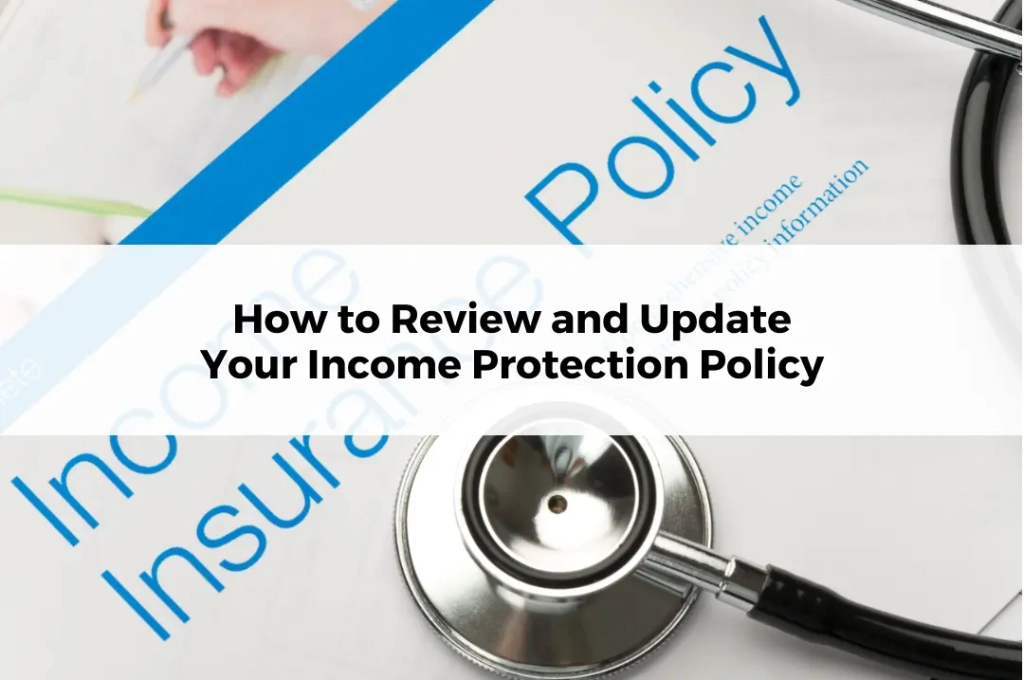How to Review and Update Your Income Protection Policy
Table of Contents
ToggleIncome protection insurance is a critical component of a well-rounded financial plan, offering a safety net that ensures financial stability if you’re unable to work due to illness or injury. However, like all insurance products, your income protection policy is not a set-and-forget arrangement. Regular reviews and updates are essential to ensure your coverage remains adequate and aligned with your evolving needs. As life circumstances change, so too should your insurance strategy. This article delves into the steps and considerations involved in reviewing and updating your income protection policy to keep it relevant and effective.
The Importance of Regularly Reviewing Your Income Protection Policy
Life is full of changes—both expected and unexpected—that can significantly impact your financial situation. Regularly reviewing your income protection policy ensures that your coverage remains appropriate for your current circumstances. Whether it’s a change in employment, an increase in income, or a shift in personal responsibilities, staying proactive with your insurance policy can prevent costly gaps in coverage and ensure that you’re adequately protected when you need it most.
Understanding the Impact of Life Changes on Your Coverage Needs
As your life evolves, so do your insurance needs. Major life events such as getting married, having children, or changing jobs can drastically alter your financial landscape. Each of these changes may necessitate an update to your income protection policy to ensure that it continues to provide the right level of coverage. Failing to adjust your policy could leave you underinsured or paying for coverage that no longer meets your needs.
Assessing Your Current Income Protection Coverage
Reviewing Policy Terms and Conditions
The first step in reviewing your income protection policy is to thoroughly examine the terms and conditions. This includes understanding the specifics of your coverage, such as the benefit period, waiting period, and the definition of disability used in the policy. Are these terms still aligned with your current needs? For instance, if your financial obligations have increased, you may need a longer benefit period or a shorter waiting period to ensure your income is adequately protected.
Evaluating the Adequacy of Your Current Coverage
Next, consider whether your current coverage is sufficient given your financial responsibilities. If your income has increased since you first took out the policy, or if you’ve taken on new debts or dependents, your existing coverage may no longer be adequate. It’s crucial to ensure that your policy would replace enough of your income to cover essential expenses if you were unable to work for an extended period.
Identifying Life Changes That Warrant a Policy Update
Changes in Employment Status or Income
A change in employment status, whether it’s a promotion, a new job, or a transition to part-time work, can impact the amount of coverage you need. If your income has increased, you may need to raise your coverage limits to maintain your standard of living in the event of a disability. Conversely, if you’ve reduced your working hours, your coverage needs might decrease, which could also lower your premiums.
Marriage, Divorce, and Family Growth
Life events such as marriage, divorce, or the birth of a child can also necessitate changes to your income protection policy. For example, marriage may increase your financial responsibilities, requiring higher coverage. Similarly, divorce may lead to changes in your financial obligations, making it essential to reassess your policy. If you’ve recently had a child, ensuring that your income protection coverage is sufficient to support your family in the event of a disability becomes even more critical.
Health Changes and Their Impact on Your Policy
Your health can directly affect your income protection coverage. If your health has improved, it might be possible to renegotiate your premiums or obtain better coverage terms. Conversely, if your health has deteriorated, it’s important to ensure that your current policy is robust enough to provide the necessary protection, as obtaining new coverage could be more challenging.
Comparing Your Policy Against New Offerings
The Importance of Staying Updated on Industry Changes
The insurance industry is constantly evolving, with new products and features being introduced regularly. Comparing your current policy against newer offerings can help you identify potential benefits or cost savings. For example, newer policies might offer enhanced coverage options, better pricing, or more flexible terms. Staying informed about these changes allows you to make sure that your income protection policy remains competitive and up-to-date.
How New Products and Features Could Benefit You
New insurance products often come with innovative features that could provide better protection or additional benefits. For instance, some modern policies offer mental health coverage or increased flexibility in claiming benefits. If your current policy lacks these features, it might be worth considering an update to ensure you have the most comprehensive coverage available.
Understanding Policy Exclusions and Limitations
Common Exclusions in Income Protection Policies
All insurance policies come with exclusions—circumstances under which the policy will not pay out. Common exclusions in income protection policies might include pre-existing conditions, certain mental health conditions, or injuries sustained while participating in high-risk activities. Understanding these exclusions is crucial, as they can significantly impact the effectiveness of your coverage.
How to Ensure Comprehensive Coverage
To ensure comprehensive coverage, consider whether any of the exclusions in your current policy could pose a risk to your financial security. If necessary, explore options to modify your policy or add riders that cover these exclusions. Working with a financial adviser can help you identify and address any potential gaps in your coverage.
Evaluating the Cost of Your Current Policy
Analysing Premiums: Are You Paying Too Much?
It’s important to regularly assess whether you’re getting good value for the premiums you’re paying. If your income protection policy has been in place for several years, you may find that better deals are now available. Additionally, if your risk profile has improved—perhaps due to lifestyle changes or quitting smoking—you may be eligible for lower premiums. Reviewing your policy costs and comparing them with current market offerings can help you determine whether it’s time to renegotiate your premiums or switch providers.
Balancing Cost with Coverage: Finding the Right Mix
While it’s tempting to reduce premiums by cutting back on coverage, it’s important to strike the right balance. Inadequate coverage can leave you vulnerable, while over-insuring can lead to unnecessary costs. A financial adviser can help you find the right mix of cost and coverage, ensuring that your policy meets your needs without stretching your budget.
Considering Additional Benefits and Riders
The Role of Indexation and Inflation Protection
Over time, inflation can erode the value of your income protection benefits. To safeguard against this, consider adding an indexation option to your policy, which increases your coverage in line with inflation. This ensures that your benefits maintain their purchasing power, even as living costs rise.
Understanding the Value of Added Benefits
Riders or additional benefits, such as lump-sum payments for certain conditions or coverage for rehabilitation costs, can enhance your income protection policy. While these added benefits can increase your premiums, they also provide additional layers of security. Carefully consider the value these riders offer and whether they align with your personal circumstances and financial goals.
The Process of Updating Your Policy
Steps to Modify Your Income Protection Coverage
Updating your income protection policy involves several steps, starting with a comprehensive review of your current coverage and identifying any gaps. From there, you’ll need to decide on the changes you want to make, whether it’s increasing coverage, adding riders, or adjusting the benefit period. Once you’ve made these decisions, your financial adviser can guide you through the process of submitting the necessary paperwork and ensuring that the changes are implemented smoothly.
How to Work with Your Financial Adviser During the Update
A financial adviser plays a crucial role in updating your income protection policy. They can provide expert advice on the best coverage options, help you understand the implications of policy changes, and ensure that your policy aligns with your broader financial plan. Regular communication with your adviser during this process is key to making informed decisions that protect your financial future.
Navigating the Application Process for Policy Changes
Documentation and Medical Assessments: What to Expect
When updating your income protection policy, you may be required to provide additional documentation or undergo a medical assessment, especially if you’re increasing your coverage or changing insurers. Understanding what to expect can help you prepare for this process. Ensure that all documentation is accurate and up-to-date, and be ready to discuss any health changes with your insurer. A smooth application process depends on clear communication and timely submission of required materials.
Tips for a Smooth Application Process
To ensure a smooth application process, work closely with your financial adviser and insurer. Provide all requested information promptly, and be prepared to answer any follow-up questions. Keeping thorough records of all communications and transactions can also help prevent misunderstandings and delays. If any issues arise, address them immediately to keep the process on track.
Avoiding Common Pitfalls When Updating Your Policy
Overlooking Small Print: The Importance of Thorough Review
One of the most common pitfalls when updating an income protection policy is overlooking the small print. Terms and conditions can vary significantly between policies, and failing to thoroughly review them can lead to unexpected surprises. Always take the time to read the policy document in full and seek clarification on any points that are unclear. This due diligence can prevent costly mistakes and ensure that your coverage meets your expectations.
How to Avoid Reducing Coverage Unintentionally
In an effort to save on premiums, some people may unintentionally reduce their coverage to a level that no longer meets their needs. It’s important to carefully consider the implications of any changes to your policy, especially if you’re reducing coverage. Working with a financial adviser can help you understand the trade-offs and ensure that any adjustments are made with a full understanding of their impact.
The Role of a Financial Adviser in Policy Review
How Expert Advice Can Optimise Your Coverage
A financial adviser’s expertise is invaluable when reviewing and updating your income protection policy. They can help you assess your current coverage, compare it with available alternatives, and make informed decisions about any changes. Their insights ensure that your policy is tailored to your specific needs, optimising both coverage and cost.
The Importance of Personalised Guidance in Policy Management
Every individual’s financial situation is unique, and personalised guidance is crucial in managing income protection policies effectively. A financial adviser can provide tailored advice that takes into account your current financial status, future goals, and personal circumstances. This personalised approach ensures that your income protection policy remains aligned with your overall financial plan, providing the security you need.
Conclusion
Regularly reviewing and updating your income protection policy is essential for maintaining financial security. Life changes, industry developments, and personal health improvements can all impact your insurance needs, making it important to stay proactive. By taking the time to assess your coverage, compare it with current offerings, and make necessary adjustments, you can ensure that your income protection policy continues to serve you well.
For those seeking expert guidance in reviewing and updating their income protection policy, professional assistance is just a phone call away. Rob Laurie and the team at Wealth Factory in Toowoomba offer personalised financial planning services that can help you optimise your coverage and secure your financial future. To learn more or to schedule a consultation, contact Wealth Factory at 07 4659 5222. Taking action today can provide peace of mind and ensure that your income protection policy is ready to meet tomorrow’s challenges









